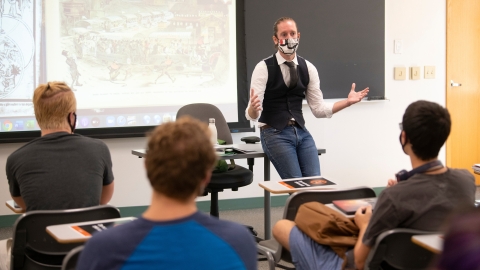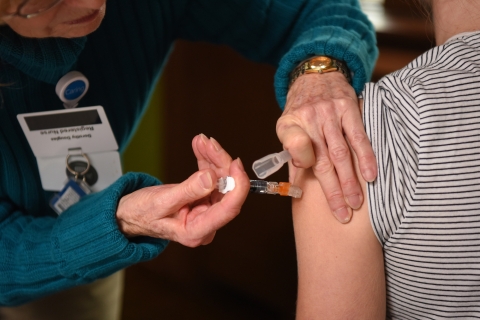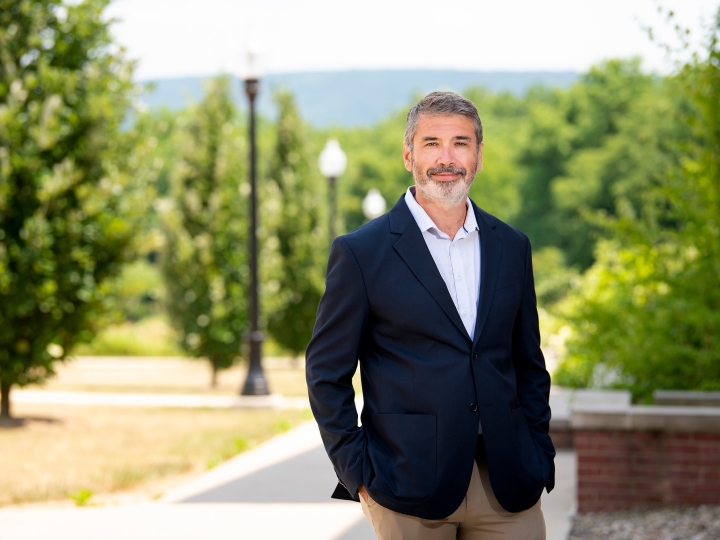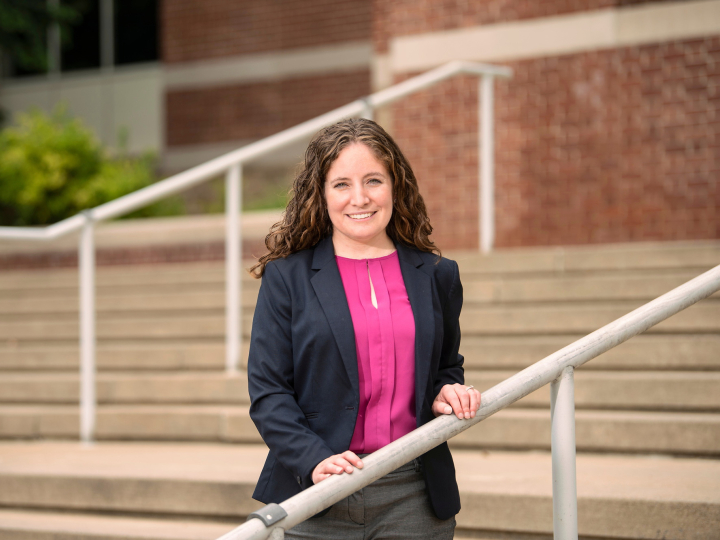
More Than Medicine: Humanities Grant Funds New Health Minor With a Liberal-arts Focus
March 16, 2022
Professor John Penniman, religious studies, teaches a class last fall. Photo by Emily Paine, Communications
The headlines are everywhere: hospital admission rates, infection spikes and projections about a years-long pandemic keep health at the forefront of our everyday concerns.
But the health landscape isn't cleanly delineated by diagnoses, pharmaceutical treatments and advancements in biomedical interventions. For Professor John Penniman, religious studies, and his colleagues in the humanities, health is a complex field of understanding rooted in people — their histories, their environments and their experiences.
"We tend to encounter medicine as a field of knowledge primarily in its activity — like when you're in the doctor's office, or having a test run in a lab, or picking up a prescription," Penniman says. "But health care is always embedded within other systems of knowledge. Race, class, culture, economics and more are constantly overlapping, and health, wellness and medicine are interwoven within them."
Penniman — whose research interests include religion and the history of medicine — is one of many Bucknell professors grappling with issues of illness and wellness, both in his personal scholarship and in the classroom. Now, he's one of 14 faculty members who will begin designing a new health humanities minor within the College of Arts & Sciences.
The minor is funded by a $150,000 grant awarded to the faculty team this spring by the National Endowment for the Humanities (NEH) and will be developed over the next three years.
Unpacking Health Humanities
An exploding field in higher education, health humanities draws upon history, philosophy, cultural studies and the social sciences to create a well-rounded, humanistic understanding of health and medicine.
How does one's culture, faith or living environment influence what it means to be healthy or sick? What influence do race, gender and class have on who is considered healthy and who is not?
"The answers aren't biological facts that can be discovered or objectively observed," says Professor Jennifer Kosmin, history. "They're reflections of cultural ideas, societal norms and values."
Kosmin's work explores the history of medicine in early modern Italy, with a focus on reproduction and women's health. By examining the social and cultural dimensions of medical knowledge, Kosmin and her students shed light on how conceptions about bodies, sexuality and disease can be deeply embedded in society.
"Of course, a key discussion is the way social, historical and geographic constructions of science have entwined with systems of power that privilege some and marginalize others," she says.
Penniman's own Digesting Divinity course takes a similar shape, revealing the intrinsic links between food and health that inform numerous religions around the world.
"In many faiths, food customs serve as a material symbol not only for commitment to the religious community but also for the health and vitality of that commitment, as well as the community as a whole," he says. "These are the kinds of nuances and complexities that a purely biomedical perspective might sidestep but that the humanities are uniquely positioned to unpack."

From unprecedented pandemics and the financial burdens of care to medical innovations that outpace legal and ethical frameworks, the humanities are ripe with tools to dissect critical concerns surrounding wellness. Photo by Emily Paine
In the new minor, students will wrestle with these multifaceted approaches to health with all of the rigorous interdisciplinary study that marks a Bucknell education.
The minor will comprise five courses, including a gateway class to be taught in rotation by the humanities faculty. A significant chunk of the NEH funding will be divided into smaller grants that will allow the professors — who represent fields ranging from art history to French & Francophone studies — to develop curriculum and coursework over the next three years.
While the minor will be open to students from any discipline, its foundation in the humanities will serve to broaden the boundaries of health and medicine far beyond the applied sciences.
"A lot of health humanities programs focus primarily on future medical practitioners or biomedical scientists, but we want to be more than a handmaiden to the sciences," says Professor Maria Antonaccio, religious studies, who directs Bucknell's Humanities Center. "We see this new educational track as a way to invite students who are interested in these topics to discover the vital and urgent questions being asked from a range of humanistic viewpoints."
Real Tools, Real Applications, In Real Time
From distrust of doctors and the financial burdens of care to medical innovations that outpace legal and ethical frameworks, the humanities are ripe with tools to dissect critical concerns surrounding wellness. For students eager to work in law, finance, policy and more, "understanding the fundamental relationships between science, culture, power and medicine is incredibly valuable and empowering," says Professor Jeremy Chow, English.
But students won't have to wait until after graduation to put these tools to work. To further distinguish Bucknell's approach to health humanities, the minor will also feature a capstone course centered on community engagement partnerships with medical and nonprofit organizations in the Susquehanna Valley. Students will work with these service providers on meaningful local projects, taking humanistic health beyond classroom curiosity and into the real world.
"The Susquehanna Valley faces food deserts, lingering health struggles in the coal region and environmental threats due to climate change," Chow says. "Given its location and resources, Bucknell has a unique opportunity to address the challenges of rural health care, and we wanted to be conscious of opportunities for students to engage with real communities in real time."
Faculty are in conversation with the Lewisburg Community Garden and Geisinger Health System, a regional medical provider that contributed a letter of recommendation to the team's grant application. The second year of the minor's development will be dedicated to solidifying collaborations and initiatives that will make the most of the collective expertise.
"Establishing Bucknell as a local, regional and national leader in the health humanities is core to our vision," Penniman says. "The expertise of our faculty, as well as other institutional partners in the area, is so strong. We seek to be ambitious about what we can do with that strength."

